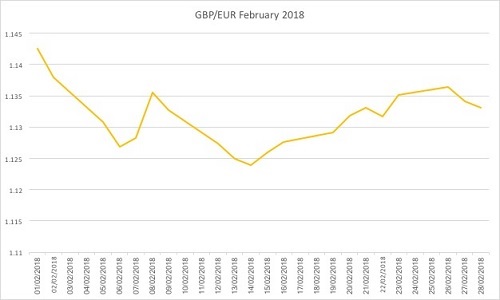Sterling/Euro Exchange Rate Review February 2018
Wednesday 07 March 2018
February was a volatile month for the pound to euro exchange rate, with some dramatic peaks and falls taking place, writes Ben Scott of FC Exchange.
Bank of England Hawks Buoy Sterling
The Bank of England (BoE) influenced sterling a lot in February and created some significant currency shifts. The pound jumped by over 1.0% against the euro at the start of the month when the central bank positively revised its growth forecasts and said inflation was likely to remain above target. Central bankers also noted that the UK might experience interest rate hikes in quicker succession than investors expected.
Later in the month, the BoE bolstered sterling again when Chief Economist Andy Haldane announced that he didn’t want the central bank to wait too long before hiking interest rates. Haldane commented: "Historically, the thing which has killed jobs has been central banks stepping on the brakes too late."
As [former US Federal Reserve Chief] Janet Yellen says, "Recoveries don’t die of old age, they die because central banks step on them, because they react too late. We’re absolutely clear, we don’t want to go back there again because it is bad news for jobs."
Additionally, the pound received a boost on the 26th February following hawkish comments to the Sunday Times from the usually dovish BoE Deputy Governor Sir Dave Ramsden. He joined the Monetary Policy Committee (MPC) in September and stated to the Sunday Times in February, "relative to where I was, I see the case for rates rising somewhat sooner rather than somewhat later."
Economic Influence
It’s been a mixed bag of economic data in February, with signs of pessimism showing in the UK’s outlook. On the 6th February sterling took a tumble lower to 1.1227 on account of Brexit concerns and disappointing data. The UK’s services PMI came in at a 16-month low at 53.0 in January, pressuring sterling lower.
The UK’s manufacturing production figure slipped to 1.4% from 3.8% on the year in December, and industrial production flat-lined at 0.0%, despite a more upbeat 2.6% in November. The UK’s goods trade balance also reached its biggest in 16 months.
However, by the 8th of February, the pound managed to gain some ground, peaking at 1.1433 as Bank of England comments supported the British currency.

In the Eurozone, retail sales dropped in December, falling from 2.8% to 1.9% on the year. UK retail sales also came in weaker than expected at 1.5% on the year in January.
Meanwhile, the Eurozone managed to produce a positive industrial production reading, with the data jumping to 5.2% on the year in December. The leap higher came from November’s 3.7% reading and passed the 4.2% forecast.
One of the most disappointing ecostats for the UK in February was the recent labour market numbers. British wages rose by only 2.5% in the three months through December on the year, remaining persistently behind inflation, currently at 3.0%. Real incomes now sit 3.5% behind the Bank of England’s forecasts from May 2016, and that gap is expected to increase to 5.0%.
The powerhouse of the Eurozone, Germany, also saw its business confidence hit in February. The Institute for Economic research survey showed a decline, but IFO President Clemens Fuest said, "Companies were less satisfied with their current business situation, but the indicator was at its second-highest level since 1991."
By February 14th, the GBP/EUR exchange rate had reached its lowest point of the month at 1.1223. Sterling’s weakness came when the International Monetary Fund (IMF) released its latest assessment of the UK economy, and stated that the UK needed to increase its productivity. By the 23rd February, the GBP/EUR currency pair was able to climb out of the 1.12 region and attain levels of 1.1375. The pound to euro exchange rate remained in the 1.13 region for the rest of the month.
Politics Abroad
When it came to politics, German Chancellor Angela Merkel was able to secure a coalition at the start of February after a somewhat shaky election last year. The move came as a shot of optimism in Eurozone politics ahead of the Italian elections in March.
However, the March elections left some downtrodden when the anti-establishment populist Five Star Movement was projected to win the most votes at around 32%. Despite being shy of the 40% needed to form a government, the development will come as a blow to the European establishment and the former Italian leader Matteo Renzi. The vote shows the mood in Italy as most voters backed parties that have formerly shown interest in a referendum on the euro and the Eurozone and was a warning shot for euro bulls.
GBP/EUR Exchange Rate Forecast
Politics appear to be a prominent factor in markets this month once again. US President Donald Trump’s decision to impose tariffs on steel and aluminium imports has seen some countries and the Eurozone threaten to retaliate with similar action. Trump responded on Twitter suggesting he may fight back by hiking tariffs on European car imports which weighed on European car companies. As the argument heats up there’s the possibility that the euro may become sensitive to developments.
Additionally, developments in the Italian situation could also create EUR sensitivity as markets watch to see who will be next to lead the country.
Brexit is another crucial factor for GBP/EUR movement after Theresa May’s recent Brexit speech which managed to appeal to a lot of the Conservative Party members. As May approaches the start of trade talks at the end of the month, sterling could become increasingly volatile. The speech saw Theresa May remind her party that the UK couldn’t have everything, but some have claimed the statement has come too late as the UK’s Autumn deadline for a deal rapidly approaches. There’s still considerable debate on how the UK’s future with the EU will look. May said: ‘Life is going to be different," she said. "In certain ways, our access to each other’s markets will be less than it is now."
Economic data in the month ahead to impact the GBP/EUR currency pair is likely to be inflation data (with some experts predicting the UK’s consumer price index will rise from 3.0% to 3.2%) unemployment figures, and growth numbers.
The Bank of England’s meeting minutes will also be carefully reviewed as markets try to price in whether the central bank will make a move higher on interest rates as early as May.
With some optimistic forecasts for European growth this year, Eurozone GDP numbers will be watched, as well as inflation numbers.
Ben Scott
Foreign Exchange Ltd
www.fcexchange.co.uk
Thank you for showing an interest in our News section.
Our News section is no longer being published although our catalogue of articles remains in place.
If you found our News useful, please have a look at France Insider, our subscription based News service with in-depth analysis, or our authoritative Guides to France.
If you require advice and assistance with the purchase of French property and moving to France, then take a look at the France Insider Property Clinic.





